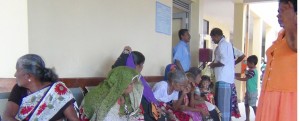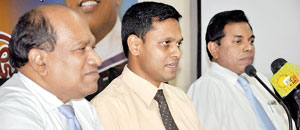News
37 hospitals to reopen after deal with doctors
Thirty-seven rural hospitals that were closed because of a lack of doctors, are soon to reopen as part of a compromise reached this week between the Health Ministry and the Government Medical Officers’ Association (GMOA).

Patients at Puttalam Hospital affected by the strike on Tuesday. Pic by Hiran Priyankara Jayasinghe
The matter was resolved after extensive discussions were held regarding the dispute over post-internship appointments that saw the GMOA resorting to a token islandwide strike on Tuesday.
According to details obtained by The Sunday Times, 42 provincial hospitals and primary care units in 15 districts are currently closed due to the non-availability of doctors. Most are in the North and East,but districts such as Anuradhapura, Polonnaruwa. Nuwara Eliya and Badulla also have three or more that have been shut down.
GMOA Secretary Dr. Nalinda Herath said the union agreed to fill the vacancies of 37 of these hospitals during discussions with Health Ministry officials.
“We could not agree on filling the remaining five because there were far too many difficulties for medical officers in these areas,” he added. Nevertheless, he said, it was a win-win situation for everyone as many of the hospitals that were closed would now be reopened.
He emphasised that this move was especially noteworthy given that about two years ago there were some 200 rural hospitals that had been closed. “We have gradually been able to reduce that number,” Dr. Herath said.
It is hard to find doctors who are willing to serve in these areas due to various difficulties, the GMOA official said. Access to these hospitals were difficult, doctors sometimes had no quarters and there was a threat from animals such as elephants in some areas. Lack of electricity and clean water were also issues.
Health Ministry sources said the ministry had put forward the proposal to fill the vacancies at these hospitals because of representations made by provincial ministers.

At the joint media conference: L to r: Health Services Deputy Director General Amal Harsha de Silva, GMOA Secretary Nalinda Herath and Health Services Director General Palitha Mahipala. Pic by Nilan Maligaspe
The continued closure of a large number of rural hospitals in the North and East was of particular concern.
“Initially, we had a list of 32 hospitals that we wanted to reopen but the GMOA itself came up with several others, and after discussions we were able to agree on filling the vacancies of 37,” one official said.
As concerns were expressed about the difficulties doctors would face in these areas, particularly the lack of living quarters, the Health Ministry has agreed to find “decent accommodation” for the doctors, the official stated.
Matters regarding the post-intern vacancy list came to a head on Tuesday after the GMOA staged a token strike claiming that the list it had agreed to earlier with the Health Ministry had been altered.
The GMOA’s Dr. Herath said the body was not certain who had manipulated the list but was happy that the Health Ministry had accepted its suggestions on amending it.
He said the list would normally include the name of a doctor along with his or her assigned designation and the hospital that the doctor has been assigned to: for example, Senior Health Officer (SHO) – Surgery at National Hospital Colombo or Medical Officer (MO) – Medicine at Peradeniya Teaching Hospital.
“However,” Dr. Herath claimed, “the list we saw had many undesignated appointments, with names being simply listed as MO at various hospitals,” Dr. Herath claimed.
According to him, sending doctors to hospitals without an assigned area of designation opens the door for administration at these hospitals to “pick and choose” doctors according to their own preferences.
“For example, the head of surgery can insist he will not work with female MOs and pick only male doctors for his unit while the hospital director has the opportunity to put the child of a friend of his into an area where there is less work,” he pointed out.
He also said it would not help in any way to reopen the closed hospitals. As such, the GMOA had insisted that the list be changed in line with their concerns and taking into account agreements reached with the Health Ministry earlier, he added.
There have also been arguments, highlighted at times by senior Health Ministry officials, that the GMOA had no legal authority to interfere in the compiling of the post-intern vacancy list.
In response, Dr. Herath said trade unions have a role to play under the Establishment Code when it comes to Transfer Boards. “Our contention is that the post-intern appointments are also transfers and we are consulting with the Ministry on this basis.”
When this question was raised at a joint media briefing held on Friday evening by Health Ministry officials and GMOA representatives, the Director-General of Health Services, Dr. Palitha Mahipala, said the ministry had to deal with different stakeholders on appointments.
“When it comes to doctors’ appointments, the GMOA is one of the main stakeholders. I believe it is good to obtain their views when it comes to such appointments,” he said.
Sources within the medical profession, however, allege there was something deeper behind the intensity of the battle waged over the post-intern vacancy list. “The list can be manipulated by both the Health Ministry and GMOA,” a member of the GMOA said.
Speaking on grounds of anonymity, the doctor said the number of vacancies could be deliberately under-reported so that others can be appointed to these vacancies later from the Transfer Board. “Both the GMOA and Health Ministry want the bigger say in post-intern appointments because it would enable one party to put its own people to selected vacancies from the Transfer Board,” the doctor said. Having your way in the post-internship lists will aid in that.”
The GMOA Secretary refuted these allegations. “We would not be talking about opening closed hospitals if this was the case, and our discussions with the Health Ministry have been amicable” he countered.
A total of 1,065 doctors will be receiving post-internship appointments this year. The Health Ministry hopes to hand over the appointments in about two weeks.

